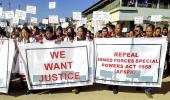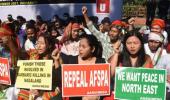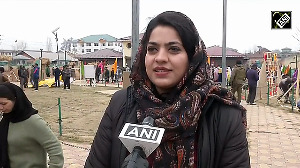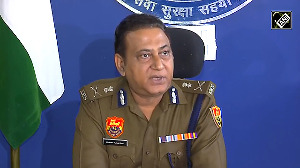AFSPA can be safely lifted from almost 90 per cent of Nagaland, argues Shekhar Gupta.

To describe the killings in Nagaland's Mon district, bordering Myanmar, merely as unfortunate will be a convenient lie and a self-serving euphemism.
It won't cut, least of all with our Naga compatriots.
It was an arrogant outrage. Incompetence is easier to understand.
Stuff happens, as tough soldiers would say. It's more important to analyse where the arrogance comes from.
Would an army unit, and that too from a true-blue special forces unit trained to world standards, with a stellar track record, have directed this volume of fire at any vehicle without checking in any other part of the country? That includes Jammu and Kashmir.
The border zones of the North East, particularly of the states with a history of insurgency, suffer from the tyranny of distance.
This is too far from the 'mainland' and national media, people are too poor and backward, who will know?
That arrogance is also fuelled by the Armed Forces Special Powers Act, or AFSPA.
Most key political parties in the North East, including the BJP's Nagaland unit, have been demanding the repeal of AFSPA.
The BJP's own coalition partner chief ministers in Meghalaya and Nagaland have made the same demand.
Here are the three tough truths we now know about this law:
This outrage would never have happened without the immunity and impunity given by this law.
The army unit then would need to take the local magistracy and police into confidence, and may take them along.
Local knowledge would most likely have prevented blotting their conscience, service record the prospect of court martials.
The more distant you are, the more important the local knowledge.
The repeal of AFSPA is an idea whose time has come. It should go forthwith. It isn't, at least in this form and sweeping application, any longer helping the armed forces, or our national interest.
And this is the toughest truth of all. That in spite of all this, the law will not go.
We can write a hundred angry editorials, hold protests, dharnas, anything. There is too much political capital riding on it.
No Indian government, least of all the Modi-Shah BJP's, would like to be seen taking such a 'soft' step.
No other party thought about this either. Not the Congress-UPA for 10 years.
And yet there is a solution. If it isn't forced by this awful massacre in Nagaland, it will be an opportunity lost, entirely to the detriment of the national interest. Here is a way forward.
Because the law won't be repealed, we should examine the possibility of applying the need-to-use principle.
Check the zones where the law is today in operation.
I have the details from our young internal security correspondent Ananya Bharadwaj.
- All of the Union Territories/states of Jammu and Kashmir, Assam, and Nagaland.
- All of the state of Manipur except the Imphal Municipal Area.
- Eastern districts of Tirap, Changlang and Longding in Arunachal Pradesh and areas falling under Namsai and Mahadevpur police station areas in Namsai district.
Now we can understand Jammu and Kashmir. It's an active operations zone, bordering a hostile and malevolent Pakistan.
It is also politically much too sensitive for any government to be seen to be softening its security policies there.
Nor has the time come for it. But, do the armed forces need the same powers everywhere else?
There is some sporadic trouble in the border zones of Manipur.
We know it may sound unconvincing when we are still hurting from the recent ambush killing of the Assam Rifles commandant, his wife and son, and four personnel in Churachandpur district.
But, in the big picture, most parts of the state, including Tangkhul district which once used to be the centre of the Naga insurgency, have been by and large peaceful.
The prudent course now would be to lift AFSPA from most of the state barring, maybe, some 25-30 km along the border with Myanmar.
There are no active Army operations in the region.
And if a convoy or patrol, god forbid, comes under attack, they have the firepower and the right to respond.
It beats us why the entire state of Assam should be under AFSPA.
It might have the odd low-intensity explosion now and then, but we see some of these in many other parts of the country, including Punjab.
In Punjab, we have seen the odd targeted assassination too.
The state remained under AFSPA between 1983 and 1997.
But, as terrorism ended, so did AFSPA.
For almost 25 years subsequently, the state has enjoyed a well-earned peace dividend.
Why is Assam to be denied this?
The United Liberation Front of Asom is mostly finished.
The Bodo rebellion is over, as most have joined the political mainstream.
The leading group of old rebels is an ally of the BJP in the state government.
If at all any trouble erupts in the Bodo areas, or from the remnants of the tribal rebel groups in the North Cachar Hills, why can't paramilitary forces respond to it under exactly the same legal regime in which they operate in much more active and dangerous Naxal zones of tribal, east-central India?
If that insurgency can be fought without AFSPA, why inflict it on enormously more peaceful Assam?
It makes zero sense to keep Assam under AFSPA unless indeed you've fallen in love with it.
This applies equally to Nagaland. The dominant rebel tribes accepted the Indian Constitution, signed up for peace, and joined the mainstream following the Shillong Peace Accord of 1975.
The group that stayed underground and fought now and then, the NSCN-IM, signed a ceasefire accord in 1997.
The state has since had almost a quarter century of complete peace.
It is true that the NSCN and some other splinter groups freely run their own 'administrations' and collect 'taxes', even from state government employees.
The army lets it be because they've been told to look the other way.
Effeatively, it's a part of the ceasefire deal.
I do not recall a pro-active army operation of any size in Nagaland for almost two decades.
Why does the entire state have to remain permanently under AFSPA then?
We've got addicted to it.
And, unlike the Sikhs and Jats of the states neighbouring Delhi, the Nagas are too few and too far to lay siege on us.
You may still want the AFSPA in some border zones of the state to watch the movement of the odd group still not accepting the ceasefire, like the NSCN-Khaplang, which is what the innocent victims of the Mon massacre were suspected to be.
As also in some adjoining border zones of Arunachal, given the strategic sensitivities, proximity with loosely watched patches of Myanmar and tribal kinships.
AFSPA can be safely lifted from almost 90 per cent of Nagaland.
In too many parts of our country, AFSPA continues only because the power of the law is heady.
In any case, who cares, as it only affects small tribal minorities in the distant North East.
Then we ask why the people in the North East are always alienated.
Let's put a trickier spin on the question.
The only active insurgencies in India, outside Kashmir, are in the tribal Naxal zones.
Lives of many more uniformed Indians are being lost there every year for the past decade than in Kashmir.
Why do we still fight this menace with only paramilitary forces?
Why do we deny them the cover of AFSPA?
The answer is simple, and cynical. This is the heartland. These tribals are Indians. Hindus too.
I have earned the ire of the Left and Right often enough by asking if it follows that the tribals of the North East or Kashmiris are less Indian.
Oh, but in Kashmir, there are the Pakistanis next door.
Now come to the North East with me.
There, East Pakistan vapourised in 1971.
Now we have a super-friendly Bangladesh, happy to hand over any of our rebels if they stray there.
Why no peace dividend for the North East?
Why are the gains of the 1971 victory denied to tribes of the North East?
Because, as we said before, AFSPA is now a deadly intoxicant. A self-destructive power kick.
By Special Arrangement with The Print
Feature Presentation: Aslam Hunani/Rediff.com












 © 2025
© 2025